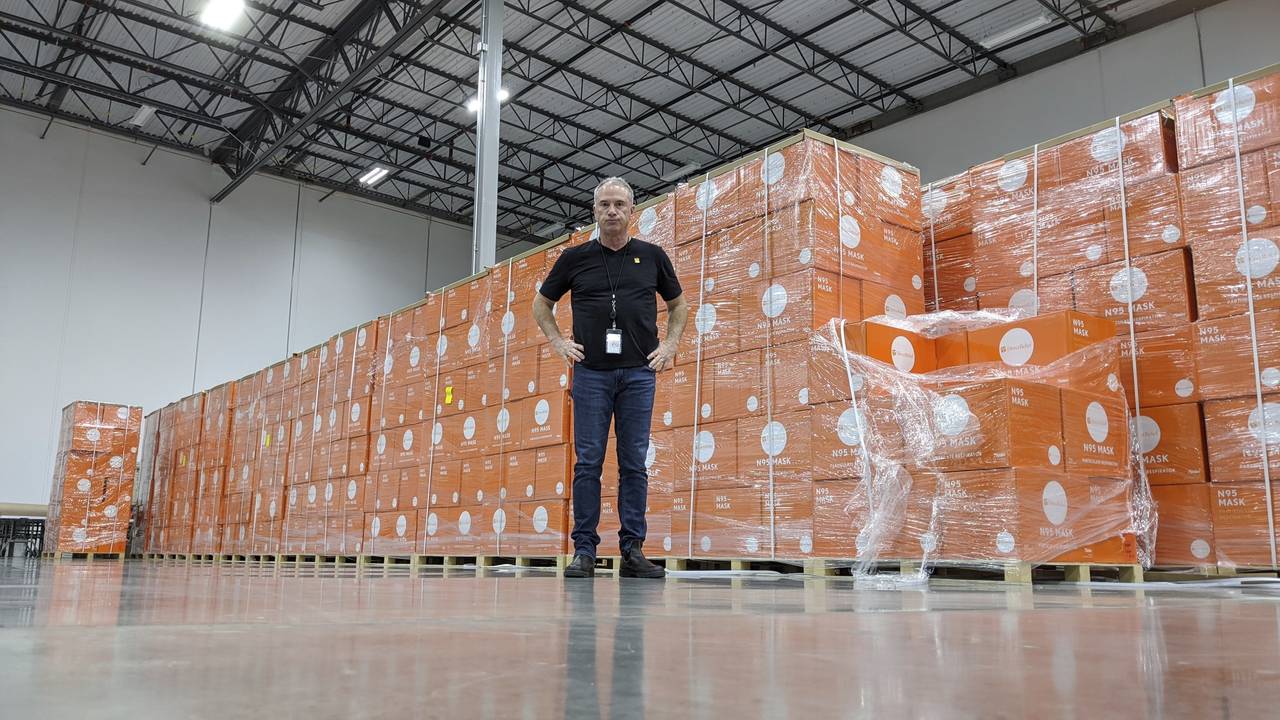Q&A: Direct Relief CEO Thomas Tighe on how to help Ukraine
Apr 28, 2022, 6:00 PM | Updated: Apr 29, 2022, 6:02 am

In this image provided by Direct Relief, Direct Relief CEO Thomas Tighe stands in front of boxes of N95 masks at Direct Relief’s Santa Barbara, Calif., warehouse and headquarters in March 2020. Since the war between Russia and Ukraine began in February, Tighe and the nonprofit humanitarian medical organization Direct Relief, where he has been president and CEO since 2000, have provided more than 50 million doses of medication and 254 tons of medical aid to those in Ukraine and neighboring countries. (Direct Relief via AP)
(Direct Relief via AP)
Thomas Tighe says helping Ukrainians can generally be done by using existing aid strategies. It’s just a matter of scale and adapting to circumstances on the ground.
Since Russia invaded Ukraine in February, Tighe and the nonprofit humanitarian medical organization Direct Relief, where he has been president and CEO since 2000, have provided more than 50 million doses of medication and 254 tons of medical aid to people in Ukraine and neighboring countries.
Earlier this month, it launched Health 4 Ukraine, a payment and distribution program that will cover 100% of prescription co-pays and 85% of non-prescription drug costs for about 400,000 Ukrainian refugees in Poland. The system was developed and launched with help from Pelion S.A., Poland’s largest healthcare company.
However, there are still some wartime requests that have — as of now — stymied Tighe and his teams.
“We have not been able to fulfill the request for hundreds of ambulances with armor in them,” said Tighe, adding that they are needed to help evacuate Ukrainians with medical issues from the country. “OK, we’re good at a lot of things, but this is not in our typical range.”
The Associated Press recently spoke with Tighe about Ukrainian aid, a topic he will also address Monday at “Crisis in Ukraine and Beyond: How You Can Help Now and Over the Long Run,” a free virtual program co-sponsored by The Associated Press, the Chronicle of Philanthropy and The Conversation. The interview was edited for clarity and length.
___
Q. You were recently in Poland working on aid for Ukrainian refugees. How was the experience?
A. It was rewarding, ultimately, to be able to do something. We actually put $10 million behind a program with a private company that wanted to step up and do it and had this capability to create a charitable pharmacy program. The Ukrainians who had to flee and were in Poland were covered by the national health insurance, but could still not obtain medication they needed because the national health insurance has a co-pay requirement. Now they can. I felt like anything you do, it’s not enough. We’ve got to do more. But it’s nice to see.
Q. Direct Relief provides aid for natural disasters, or for health crises like the COVID-19 pandemic, as well as the logistics and the supplies for those helping out on the front lines. Does any of that operational knowledge transfer to a wartime situation like we have in Ukraine? Or do you have to come up with a brand new game plan?
A. Some does, but at the abstract level. A wildfire, earthquake, hurricane — the disruptive event simultaneously spikes demand for health services, because people get hurt or injured, and decreases the capacity to deliver the service, because hospitals are damaged or roads are out. We’re used to that at the abstract level. The difference here is that if there’s an earthquake, people immediately pull together to try to open up the distribution channel. Here, the capacity is getting worse because hospitals keep getting bombed. There’s targeting of the infrastructure. So when people are trying to open up the supply lines to rebuild the capacity, they keep getting destroyed. That’s the adjustment. You have to reallocate things because it’s a dynamic situation.
Q. Logistics in those situations are hard enough. Layering wartime safety precautions on top of that must make it exponentially harder.
A. It feels like this is an event that should be in black and white in a high school history book or something. Instead, I’m seeing it on TV every night. But what you’re also seeing is this kind of uncommon courage in Ukraine. What the Polish people are doing, it’s embodying righteousness. What the Russians are doing is embodying cruelty. It certainly makes anything we’re doing seem very small. But it’s good motivation to keep doing it.
Q. How would you suggest individual donors who want to help take action?
A. Figure out what you care about. For personal philanthropy, it’s really important to find something you believe in, so that your act of generosity is going to actually translate into something you really feel good about. And that’s such a personal choice. Then, do your homework. It’s just general consumer advice, but look up and see if the group is explaining what they’re doing with the money. I think the downside of these high profile emotionally charged events is it can lend itself to exploitation from a fundraising perspective. The Ukrainian people’s tragedy is not an excuse for fundraising. And there’s an obligation if you receive money for Ukraine, it’s not for you. It’s for you to help the people of Ukraine.
____
To hear Tighe speak at “Crisis in Ukraine and Beyond,” a free virtual event co-sponsored by Associated Press, the Chronicle of Philanthropy and The Conversation, register at https://bit.ly/ukrainecrisiswebinar.
Associated Press coverage of philanthropy and nonprofits receives support through the AP’s collaboration with The Conversation US, with funding from Lilly Endowment Inc. The AP is solely responsible for this content. For all of AP’s philanthropy coverage, visit https://apnews.com/hub/philanthropy.
Copyright © The Associated Press. All rights reserved. This material may not be published, broadcast, rewritten or redistributed.












